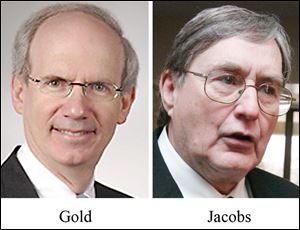
ProMedica-University of Toledo tiff may keep doctors away
8/28/2007
Kristen Kunklier, a third-year medical student and a student trustee on UT s board of trustees, feels loyal to Toledo but is unsure how long she ll be able to remain in the area.
Kristen Kunklier has lived in Toledo for six years, starting as a University of Toledo freshman, but the medical student doesn t know how much longer she will stay in her adoptive city.
Doing a residency program in the area hinges on whether officials for the UT Health Science Campus, formerly the Medical College of Ohio, and ProMedica Health System can finally settle their differences after nearly a decade of problems that has at times eliminated medical education at Toledo Hospital. Otherwise, Ms. Kunklier said, medical education will remain unstable and undesirable in the competitive Toledo health-care market.
This year, just 8 percent of UT medical school graduates stayed in northwest Ohio for their residency programs, down from 21 percent 10 years ago. Many doctors end up in the communities where they did residencies, so the drop is especially worrisome for UT officials who have been advised that the area could experience a doctor shortage in some specialties in about five years.
This is a huge issue for northwest Ohio, said Ms. Kunklier, a third-year medical student and member of UT s board of trustees. A lot of us feel loyal ties to Toledo and would like to stay here, but this is just one more thing making us think twice about it.
Today is the third extension deadline for a contract between UT and ProMedica allowing about 70 third-year medical students to do six-week rotations in pediatrics and obstetrics/gynecology at Toledo Hospital, or about a dozen at a time. A special UT board of trustees meeting has been called today to discuss negotiations with ProMedica.
While UT hopes to secure that contract, plus guarantee the future of educational programs at hospitals for both students and residents, ProMedica wants to bundle insurance issues and other discussions into negotiations. The Toledo health-care system, for example, wants employees with its Paramount health insurance at both ProMedica and UT Health Science Campus facilities to be able to visit doctors and hospitals within either for the same fee.
But UT doesn t want to exclude other Toledo area health-care providers, including ProMedica s chief rival, Mercy Health Partners.

CTY Gold Handout not Blade photo Dr. Jeffrey P. Gold, executive vice president and provost of health affairs and College of Medicine dean.
UT President Dr. Lloyd Jacobs told The Blade last week that the root of problems for medical education goes beyond students and new doctors: ProMedica s business strategy of creating an integrated, closed health-care system ultimately hurts the community.
Toledo has been unable to recruit a pediatric oncologist because there is not enough business to support a practice through either ProMedica or other local hospitals without cooperation among them, Dr. Jacobs said.
Two other types of specialists, meanwhile, have left after less than a year in the Toledo area because of uncertainty in local health care, he said.
I think it affects every parent in this community, Dr. Jacobs said. It actually affects every child in this community.
Plus, Dr. Jacobs said, cities with strong residency programs tend to have higher-quality health care. Other communities with competitive health-care systems do not draw medical education issues into rivalries, either, he and other doctors said.
A ProMedica official last week declined to comment on local medical education and competition issues.
Steven Mooney, president of ProMedica Health, Education and Research Corp., said that he doesn t want to say anything that could get in the way of contract discussions with UT, and that he remains hopeful for a resolution.
Troubles between ProMedica and the former MCO surfaced in 1999, when the hospital system severed ties with the medical school. Relations tentatively started to mend three years later.
A Mercy official yesterday said medical education and business decisions should not be tied together. Mercy has 190 residents at its hospitals, including about 42 from UT at St. Vincent Mercy Medical Center in Toledo.
Mercy Health Partners has long recognized the importance of medical residency programs to the quality of care and the quality of life in this community and has backed this recognition with consistent, unwavering support for graduate medical programs for more than 100 years, Dr. Imran Andrabi, Mercy s chief academic officer, said in a statement.
Residency concerns
UT officials have been concerned about the quality of its residency program for years. A panel of four outside doctors serving as consultants last year confirmed their suspicions, saying graduate medical education programs are weak, at best as intense competition stresses UT s relationships with hospitals and other training sites.
An estimated 25 percent of Toledo doctors may retire in five to seven years, which combined with the inability to retain UT medical school graduates likely will create a shortage, especially in some specialty areas, the panel said.
While there may not be a shortage of general pediatricians in five years, areas such as pediatric psychiatry will be lacking, said Dr. David Krol, chairman of the pediatrics department at UT s college of medicine.
We need physicians in our community, he said. We don t want you to have to go to Columbus, Cleveland, wherever.
The panel advised UT that a consortium of community leaders should be created to oversee graduate medical education, but that effort has not succeeded despite a meeting this spring, said Dr. Jeffrey Gold, dean of UT s college of medicine.
The Toledo area has the hospitals, clinical teaching faculty, and number of patients to offer quality education, but providers need to be aligned, he said.
Security sought
Otherwise, the Toledo area risks not being able to train its own doctors, because students and residents need a secure environment, said Dr. Mary Smith, UT s associate dean for clinical undergraduate and graduate medical education.
I hope we can get there, and I hope we can get there soon, she said.
Eventually, UT s medical school may have trouble attracting students, said Ms. Kunklier, the third-year medical student who is doing an obstetrics/gynecology rotation at a private practice that does deliveries at St. Vincent.
Medical students don t want to be distracted from patients and studies by tensions among institutions, and if fewer hospitals and doctors are involved in teaching, then they won t get as much clinical experience, she said.
I just feel like this is one thing we shouldn t have to worry about, having a place to learn, she said.
Contact Julie M. McKinnon at:jmckinnon@theblade.comor 419-724-6087.